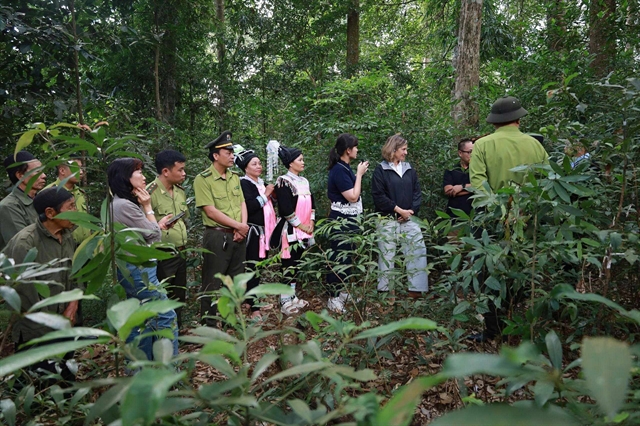 Environment
Environment

 |
| The "Carbon for Good" project aims to enhance climate governance for nature-positive adaptation and mitigation through the development of a high-quality forestry carbon market. Photo courtesy of Canada's Embassy in Hà Nội |
LAI CHÂU – A project was launched in Lai Châu Province on Friday, aiming to strengthen climate resilience and promote sustainable forest management across four provinces of Tuyên Quang, Lai Châu, Sơn La, and Cần Thơ.
Implemented by CARE, CIFOR, and the University of British Columbia, the “Carbon for Good” project will leverage Canada’s expertise in forestry management and explore opportunities for collaboration with Canadian stakeholders, including companies, investors, academic institutions, and government agencies.
Running until March 2028, the project forms part of Canada’s broader commitment to advancing a high-quality forestry carbon market in Việt Nam. It seeks to accelerate climate adaptation and resilience while supporting Việt Nam in achieving its national goals for climate action, biodiversity conservation, and inclusive socio-economic development.
At a time when rising temperatures, biodiversity loss, and deforestation are disrupting livelihoods, the initiative will empower communities and local authorities to lead climate action and forest conservation efforts — while unlocking new opportunities through the emerging carbon market.
The project aims to enhance climate governance for nature-positive adaptation and mitigation through the development of a high-quality forestry carbon market, alongside stronger private sector engagement in financing and implementing forest-based carbon projects. It will also place a strong emphasis on community-based forest governance in four biodiverse provinces.
The four participating localities are advancing their readiness to participate in the international forest carbon credit market — an important step in realising the economic potential of forest resources and supporting Việt Nam’s national pathway toward net-zero emissions by 2050.
To ensure market readiness, the project will deliver four key outcomes:
Forest Carbon Potential Assessment: A detailed report assessing each province’s forest carbon absorption and storage potential, providing the foundational data needed to quantify future carbon credit generation.
Emission Reduction Feasibility: An evaluation report on the provinces’ capacity to meet future national greenhouse gas (GHG) reduction targets assigned by the Government, ensuring both compliance and ambition.
Market-Ready Data Profiles: Comprehensive dossiers for each province detailing forest carbon credit development potential, positioning them to engage in the carbon credit market once regulatory approval is granted.
Specialized Capacity Building: Advanced training on carbon valuation methods, project development, and carbon market risk and opportunity assessment, strengthening the capacity of provincial officials and local enterprises.
These outcomes are expected to transform forest assets into sustainable revenue streams, improve local livelihoods, and contribute meaningfully to Việt Nam’s climate goals.
“We are combining local knowledge with innovative solutions to not only address climate change but also ensure local communities—especially ethnic minority women—have their voices heard in related decisions,” said Vương Thái Nga, Program Director of CARE in Vietnam. “Crucially, this project will help create lasting economic opportunities for those who need them most.”
A central component of the project is collaboration among government agencies, national and Canadian private sector partners, and local communities to ensure that Vietnam’s emerging carbon market is socially inclusive, environmentally sound, and economically viable.




